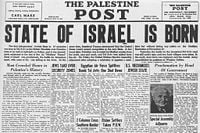Jerusalem Post
| The Jerusalem Post | |
|---|---|
 The May 16, 1948 Palestine Post headline announcing the creation of the state of Israel | |
| Type | Daily newspaper |
| Format | Broadsheet |
| Owner | CanWest Global Communications |
| Founded | December 1, 1932 (as The Palestine Post) |
| Headquarters | |
| Website: www.jpost.com | |
The Jerusalem Post is an Israeli daily English language broadsheet newspaper, founded on December 1, 1932, by Gershon Agron as The Palestine Post. The newspaper has a daily readership of only about 50,000, but it is widely read by Israeli politicians and foreign journalists and so has a broader reach than other newspapers in Israel. The newspaper is now viewed as having a right of center view on politics.
History
The Palestine Post was founded on December 1, 1932 by American journalist-turned-newspaper-editor, Gershon Agron in Mandate Palestine. During its time as The Palestine Post, the publication supported the struggle for a Jewish homeland in Palestine and openly opposed British policy restricting Jewish immigration during the Mandate period.
On the evening of February 1, 1948, a car exploded outside the Jerusalem building housing the Palestine Post. The building also contained other newspaper offices, the British press censor, the Jewish settlement police, and a Hagana post with a cache of weapons. The bomb destroyed the Hagana post, a large part of the Palestine Post offices, and badly damaged several nearby buildings. One typesetter died and about 20 people were injured. The morning edition of the Palestine Post appeared in reduced format. The bombing was the work of Fawzi el-Kuttub, under the command of Arab leader Abd al-Qadir al-Husayni. Al-Husayni claimed responsibility for the bombing, but Hagana leaders did not believe that the Arab forces were capable of such operations and suspected various other parties, including Etzel, British forces, and "German saboteurs".[1]
The newspaper's name was changed in 1950, two years after the state of Israel was declared and the Mandate of Palestine ended.
Until 1989 the Jerusalem Post supported the forerunners of the Labour Party and had a liberal or left of center political orientation. In 1989 it was purchased by Hollinger Inc. Under the control of Canadian conservative newspaper magnate Conrad Black the paper became supportive of the Likud. A number of journalists resigned from the Post after Black's takeover and founded the left-wing weekly Jerusalem Report, which eventually was sold to the Post. On November 16, 2004, Hollinger sold the paper to Mirkaei Tikshoret Ltd., a Tel Aviv-based publisher of Israeli newspapers. CanWest Global Communications, Canada's biggest media concern, had announced an agreement to take a 50 percent stake in the Jerusalem Post after Mirkaei bought the property, but the Mirkaei pulled out of the deal. CanWest sued in court, but lost.
Today
The newspaper is viewed as having a moderate right of center slant on news coverage, although left-wing columns are often featured on the editorial pages. It espouses economic positions close to those of neoliberalism: tight fiscal control on public spending, curbing of welfare, cutting taxes, and anti-union monopoly legislation, among others. The paper competes with the libertarian Haaretz newspaper, which began publishing an English language edition in the 1990s as an insert to the International Herald Tribune.
As with other Israeli newspapers, the Jerusalem Post is published from Sunday to Friday, with no edition appearing on Saturday (the Jewish Sabbath) and Jewish religious holidays.
In print, the Jerusalem Post also publishes other editions geared for the local and foreign markets: a Christian Edition, French, 'International', as well as several kids and youth magazines. In 2007, it also started publishing a Hebrew-only business daily called The Business Post. The newspaper also maintains an online edition named jpost.com.
Notes
- ↑ Uri Milstein, History of Israel's War of Independence, Vol III (English edition: University Press of America, 1997, ISBN 0761807691), pages 105-107.
ReferencesISBN links support NWE through referral fees
- Palestine Post Founded (Jerusalem Post Founded) - December 1, 1932
- Front page Israel: Major events as reflected in the front pages of the Jerusalem post, Jerusalem Post (1987). ISBN 0933503091
- Frenkel, Erwin. The Press and Politics in Israel: The Jerusalem Post from 1932 to the Present, Greenwood Press (1993). ISBN 0313289573
- Hart, Harold. Yom Kippur plus 100 days: The human side of the war and its aftermath, as shown through the columns of the Jerusalem post, Hart Publishing Co. (1974). ISBN 0805511326
- Landau, Asher. The Jerusalem Post Law Reports, Geffen Books (1996). ISBN 9652238279
External links
- Jerusalem Post - Internet Edition
- Jerusalem Post - French Edition
- Palestine Post - complete searchable contents 1932-1950
Credits
New World Encyclopedia writers and editors rewrote and completed the Wikipedia article in accordance with New World Encyclopedia standards. This article abides by terms of the Creative Commons CC-by-sa 3.0 License (CC-by-sa), which may be used and disseminated with proper attribution. Credit is due under the terms of this license that can reference both the New World Encyclopedia contributors and the selfless volunteer contributors of the Wikimedia Foundation. To cite this article click here for a list of acceptable citing formats.The history of earlier contributions by wikipedians is accessible to researchers here:
The history of this article since it was imported to New World Encyclopedia:
Note: Some restrictions may apply to use of individual images which are separately licensed.